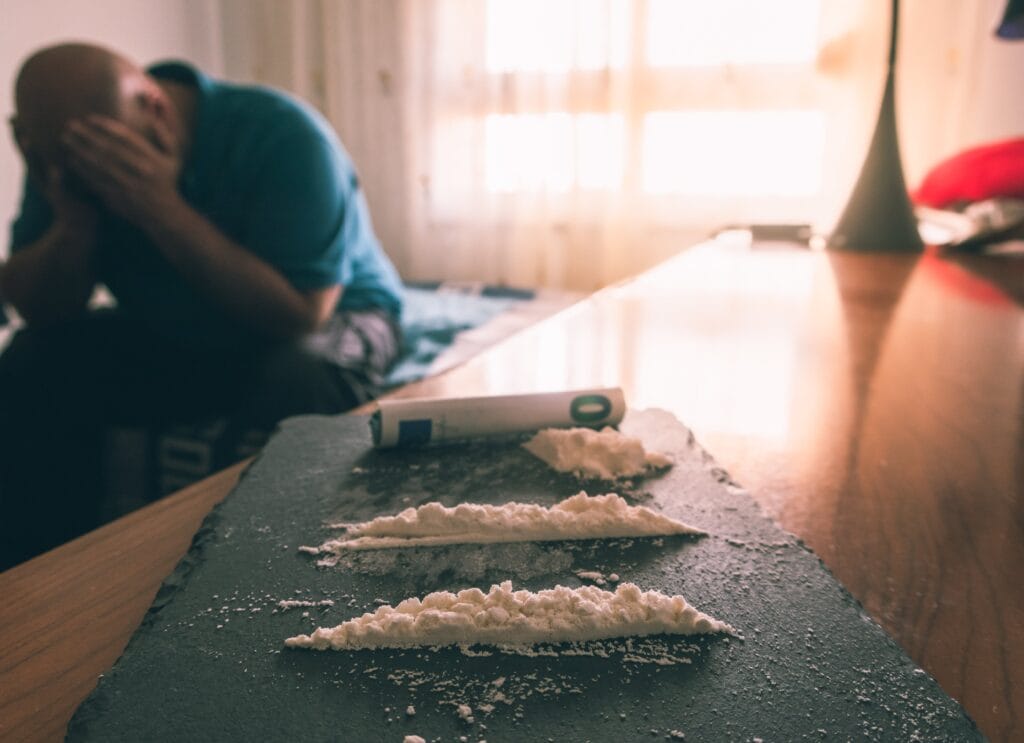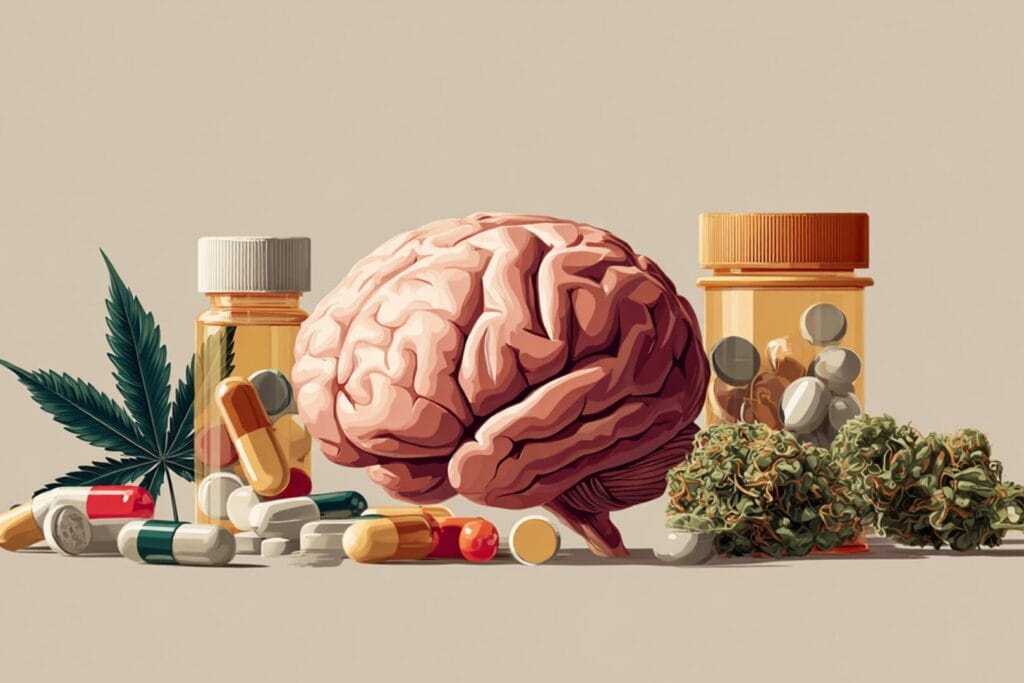When you’re struggling with cocaine addiction, it’s a complex, very personal journey. You might wonder about alternatives to traditional rehab settings as you grapple with addiction. In many cases, addiction does require a formal treatment program, but not always.
How Does Cocaine Addiction Develop?
Cocaine addiction, like is true with other substance use disorders, involves a complicated coming together of biological, social, and psychological factors. At the core, cocaine addiction comes from the powerful effects of the drug on your brain’s reward system.
When you consume cocaine, it very quickly causes your dopamine levels to soar. Dopamine is the brain neurotransmitter linked to pleasure and reward.
When you have a dopamine surge from using cocaine, it can create feelings of euphoria, energy, and confidence. These positive feelings reinforce your desire to keep using cocaine so you can continue experiencing them.
Repeatedly using cocaine causes neuroadaptation. In neuroadaptation, your brain adjusts to the drugs’ presence, reducing dopamine sensitivity. You, as a result, require larger cocaine doses to get the same high, which leads to escalating use cycles.
Chronic cocaine use can change the function and structure of essential brain regions as well, including the parts involved in impulse control, decision-making, and stress regulation. The changes contribute to the compulsive drug-seeking behaviors that come with cocaine addiction.
There are also genetic factors that can be part of predisposing you to develop an addiction more quickly than other people. There may be variations in the genes related to your dopamine receptors and other neurotransmitter systems. Those variations influence how vulnerable you are to cocaine addiction.
Other things that can increase your cocaine addiction risk include trauma, stress, and peer influences.
When you understand the complex and biological parts of addiction, it highlights the importance of a comprehensive treatment approach. Treatment addresses not only dependence on the drug and helps you to get sober but also helps to treat the underlying brain changes and co-occurring mental issues that are likely playing a role.
What Happens During Rehab for Cocaine Addiction?
When you receive structured treatment for cocaine addiction, some of the things you might expect include:
- Detoxification: The first step of your treatment plan usually involves detox to manage withdrawal symptoms as your body clears cocaine. You may need medical supervision as you detox to address any complications and give you adequate support during this time.
- Behavioral therapy: Different types of behavioral therapy are used as a way to address the psychological components of addiction. You work with therapists to explore your harmful or unhealthy ways of thinking and behaving, especially as they relate to cocaine use. You also develop strategies for coping and set recovery goals for yourself.
- Support groups: During treatment, you might start participating in support groups, such as Cocaine Anonymous (CA) or Narcotics Anonymous (NA). These groups create a sense of community and facilitate support, encouragement, and accountability.
- Education and skill building: In a cocaine rehab program, you learn about addiction and the effects it can have on you mentally and physically. You’ll also likely learn relapse prevention training and skills training in problem-solving and stress management. You’ll use these tools to navigate life challenges without using cocaine.
- Aftercare planning: Life after rehab should also be addressed. A rehab program will help you develop an aftercare plan personalized to you so you can maintain your recovery after formal treatment. Your plan might include support group participation, ongoing therapy, vocational training, sober living, and other resources and strategies to maintain long-term sobriety.
Cocaine addiction treatment should address all of your individual needs and circumstances within a supportive, structured environment.
Why Is Professional Treatment Usually Necessary for Cocaine Addiction?
Receiving professional treatment is vital for several reasons.
First, you may need medical supervision as you go through detox. It can be mentally and physically distressing.
Addiction treatment professionals are also equipped to do thorough assessments to identify your unique needs, which might impact your recovery. This could include medical or mental conditions. The assessment allows for developing a personalized treatment plan based on your circumstances.
During rehab in a professional environment, there’s the use of evidence-based therapies and interventions proven effective in addressing cocaine addiction. The environment is also structured so you can fully focus on your recovery.
Finally, addiction is a chronic condition often requiring ongoing management and support. In a professional program, you can go through a continuum of care that will help support your sustained recovery.
Can You Overcome Cocaine Addiction Without Rehab?
While it’s not usually the recommended option, it is possible to overcome cocaine addiction without formal rehab.
You have to be self-aware to do so and acknowledge the impact addiction has on your life.
You must also identify the triggers that lead to use and find ways to cope effectively. Building a support network can help you stay encouraged and motivated and work on improving your overall health and well-being through lifestyle changes.
Unfortunately, if you’re trying to recover from addiction without professional support, you may not have the needed resources for a comprehensive approach.
Get Help for Cocaine Addiction
While the journey to overcome a cocaine addiction is incredibly challenging, professional help through rehab gives you a supportive, structured, and comprehensive treatment approach. In a rehab program, you have access to the expertise, guidance, and resources you need to address the many complexities of addiction, including personalized assessment, evidence-based therapies, medical supervision, and peer support. Rehab offers you a healing path, prioritizing your well-being and success.
If you or someone you love is dealing with cocaine addiction, take a step toward recovery with San Diego Detox. We can help you with tailored care and a commitment to supporting you through each step of the recovery process. Reach out to us today.
Frequently Asked Questions
Professional treatment is often recommended because cocaine detox and addiction recovery can involve significant medical, psychological and environmental factors—such as withdrawal, co-occurring mental health issues, structural brain changes, and relapse risk. A structured program, like the ones offered at San Diego Detox, provides continuous support, evidence-based therapies, and safe monitoring.
The likelihood of success increases when the individual:
Acknowledges the addiction and its impact early;
Has a stable, supportive environment (family, friends, accountability);
Removes or limits exposure to triggers and high-risk situations;
Engages in healthy routines (sleep, nutrition, exercise, meaningful activity);
Pursues self-help, outpatient therapy or support groups as alternate pathways.
Trying to recover without professional help carries risks such as: unmanaged withdrawal symptoms, hidden or untreated co-occurring mental health disorders, lack of relapse-prevention planning, insufficient coping-skills training, and no medical supervision. Without structure, even individuals with strong will can relapse or stall in progress.
A good treatment program should offer: licensed medical staff, evidence-based therapies, support for dual diagnosis (mental health + substance use), aftercare/relapse prevention planning, confidentiality and comfort (which San Diego Detox emphasizes). It’s also wise to verify credentials and licensing (e.g., California DHCS license) and inquire about individualized care.







